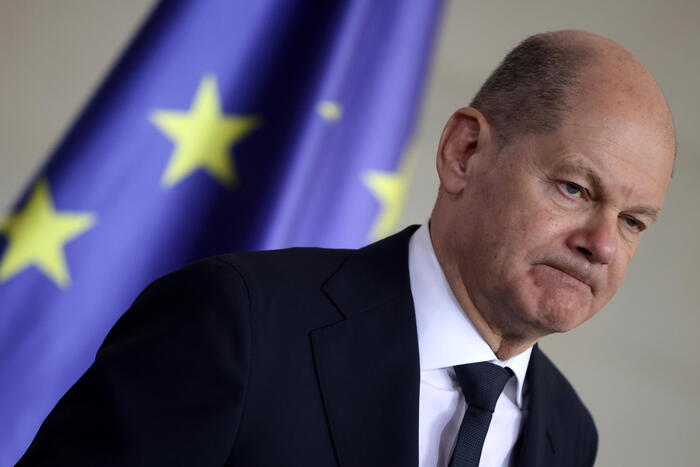Enlarge image
Scholz, Baerbock, Laschet: Almost like a camp election campaign
Photo: Kay Nietfeld / dpa
9:54 p.m.
Olaf Scholz enters the foyer in front of the television studio H in Berlin-Adlershof.
Actually, his SPD supporters should now surround him to celebrate him after the recent TV debate - that's what the iron Post-Triell law wants.
But Scholz is heading for representatives from another party.
Katrin Göring-Eckardt, Claudia Roth, Anton Hofreiter: First of all, Scholz grins in green faces.
His own people, SPD General Secretary Lars Klingbeil and Labor Minister Hubertus Heil, wait a little furtively next to them before they can hand over the mandatory bottle of beer to their candidate for Chancellor.
It is the demonstrative continuation of a red-green flirtation, which was to be examined a few meters further in the previous 90 minutes in front of running cameras.
Whether minimum wage or taxes - Scholz ensnared his dream partner: he wants to rule with the Greens.
Only: Can that work too?
The SPD is still ahead in the polls.
But the CDU seems to have bottomed out.
The race for the Chancellery is still completely open.
It is the last TV triall in which Scholz, the Green Chancellor candidate Annalena Baerbock and Union applicant Armin Laschet meet before the general election.
This may lead to fatigue effects in some viewers.
On the other hand, there is a lot at stake this time.
There are only seven days left until the election.
There will be no further TV rounds.
Mistakes can hardly be made good now.
So what's left of this TV finale? What were the candidates doing this time? And how did they fare? The analysis of the trial.
Strategy and demeanor
The starting position is similar to last Sunday.
Scholz and his SPD are leading the polls at a level that the Social Democrats could hardly have dreamed of until recently.
For him it is therefore important: stay calm, make as few mistakes as possible.
When Baerbock as Minister of Finance asks him about the weaknesses in the money laundering investigation, perhaps the most delicate moment for Scholz, he replies: Thank you very much for the question.
Laschet, in turn, last switched to attack mode.
In the last triell, he attacked Scholz quite aggressively.
Actually, he should do that again now to mobilize the Union's regular voters.
Only: Laschet hardly gets around to it.
Social, climate, Corona - it is not Laschet's topics that dominate this show.
Laschet remains on the defensive for a long time, only with internal security he can set real accents.
Quite different from Baerbock: Now that, according to the surveys, she hardly has a chance at the Chancellery, she is really blossoming.
Baerbock hands out vigorously, sometimes against "the two gentlemen going on like this," but especially against Laschet.
When it comes to phasing out coal, she snaps at him: "I wonder what's going on with you, Mr. Laschet?"
Violent exchange of blows
There are several things going on this evening, especially when it comes to taxes: Laschet accuses the SPD and the Greens of "punishing" small entrepreneurs with an inheritance or wealth tax.
"Can you stay with the facts, please?" Baerbock snaps at him.
Scholz, on the other hand, takes Baerbock's side.
Sure, like the Greens, the SPD want tax increases for top earners.
It is one of the few moments when Scholz exudes aggressiveness.
The Union stands for relief for high earners.
That is "not financially" and "not very solidary".
Immediately afterwards, Baerbock and Laschet clash again.
It's about child poverty.
It is "terrible," says Laschet.
Baerbock: "But you don't want to do anything about it."
The weakest moment
The two moderators have prepared a little game.
The candidates should ask each other questions.
Baerbock to Scholz, Scholz to Laschet, Laschet to Baerbock.
Only: The CDU boss is the only one who doesn't take the task seriously - he uses it for a rather cheap trick.
Up to this point, Laschet hardly had a chance to say what he really wanted to get rid of: a clear attack against Scholz.
Of course, the latest excitement about investigations in his finance ministry is good for this.
Laschet therefore doesn't actually ask Baerbock a real question.
He simply uses it as a vehicle.
The Greens had requested a special session of the Bundestag on the subject, says Laschet.
What can Baerbock expect from Scholz?
Transparency, replies.
Laschet does not achieve more.
The biggest charm offensive
At times it looked as if the Chancellor and Vice-Chancellor were already discussing with the CDU opposition leader.
When they are asked about their coalition wishes, Scholz says he is "making no secret of it" and that he would prefer to "form a government with the Greens."
It's tricky because both want to govern together, but at the same time try to take voters away from each other: The SPD wants to attract Green voters who want to prevent a Chancellor Laschet.
The Greens, on the other hand, try to attract SPD voters with social accents.
Above all, Baerbock would like to send the CDU into the opposition, Scholz sees it very similarly. You almost feel reminded of the days of the camp election campaigns, if it weren't for the issue of climate protection, where the Greens always shoot violently against the SPD. For "real departure", Baerbock insists, strong greens are needed.












/cloudfront-eu-central-1.images.arcpublishing.com/prisa/KMEYMJKESBAZBE4MRBAM4TGHIQ.jpg)


